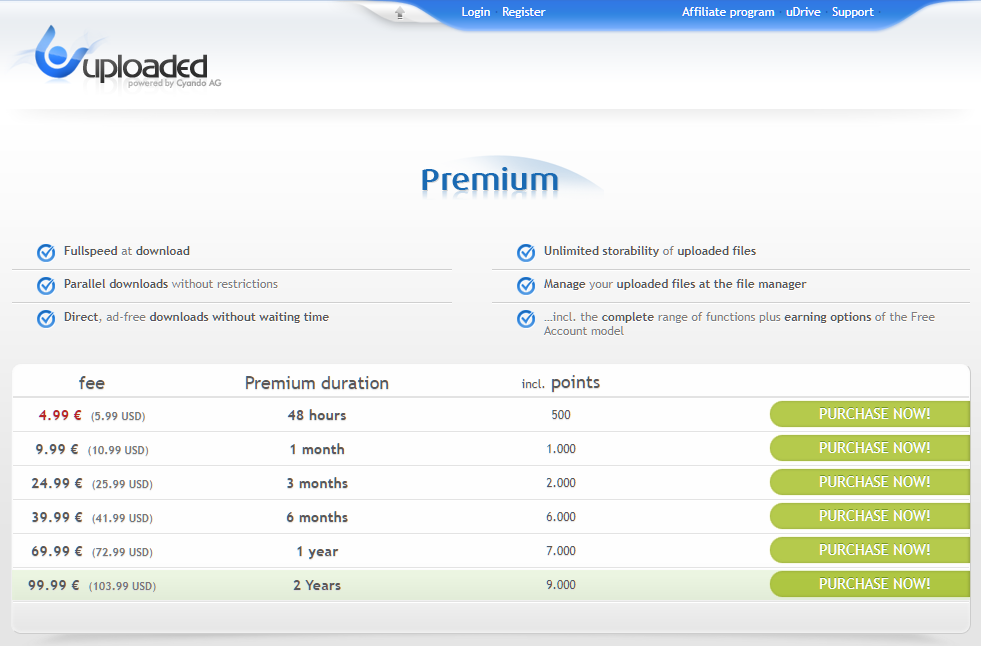 When the U.S. Government shut down Megaupload in 2012, similar platforms were presented with a practical example of what could happen to their businesses too.
When the U.S. Government shut down Megaupload in 2012, similar platforms were presented with a practical example of what could happen to their businesses too.
A few dozen armed police officers and helicopters swooping in for Kim Dotcom was certainly eye-catching, but the world learned something else too; hosting files can make people ridiculously rich and with Megaupload gone, there was a big gap in the market.
Founded in 2005 and acquired by Switzerland-based Cyando AG in 2012, file-hosting platform Uploaded wasted no time attracting new customers and the wrong type of attention. In 2015, the RIAA bemoaned Uploaded’s 100 million monthly visits, its status as the “third biggest copyright infringer” based on Google data, and the existence of reward schemes.
According to users who upload popular files to Uploaded, those reward schemes haven’t been living up to expectations for quite some time. But in just a couple of days, maybe even less, Uploaded itself will cease to exist.
Uploaded Throws in the Towel
Visitors to Uploaded.net today see a normal-looking site with no shutdown notice or solemn eulogy. But when a site won’t take your money, that’s never a good sign.
Whether it’s a payment of $5.99 for 48 hours or $103.99 for two years, nothing works – much like the site’s SSL certificate over the past few weeks.

The reason for this is laid out in at least two emails sent by Cyando. The first variant targets Uploaded users who may have relied on the site for their offsite backups.
“Dear Customers,” it begins. “Please be advised that our services will be shut down on November 30th 2022. Should you need to backup any files, we recommend to do that until this date. Kind regards, Cyando AG.”
November 30 ends in less than two days, but the email’s wording (specifically the word ‘until’) doesn’t inspire confidence that Uploaded will still be online this Wednesday. Those looking for clarification or additional information won’t find it in the second email variant either.
“We are very sorry, but unfortunately the situation is such that http://uploaded.net has to be closed. Management will contact you with all other information related to your account in the next few days. Thank you for your understanding and we wish you all the best,” it reads.
Given the apparent urgency of Uploaded’s exit, which doesn’t even allow for a reasonable period to retrieve files, timely refunds and sudden affiliate payouts seem somewhat unlikely. Years of legal problems that started badly and then deteriorated don’t improve things either.
Uploaded’s Copyright Quagmire
Uploaded’s problems with copyright holders date back at least eight years.
In 2014, the Regional Court of Hamburg in Germany found that the service failed to delete copyrighted content quickly enough in the face of takedown notices. But that was just the beginning and a sign of things to come.
Uploaded’s parent company Cyando was sued by publisher Elsevier for distributing pirated books as far back as 2013. Music producer Frank Peterson, who also sued YouTube and Google for making his music available without permission, had his copyright complaint against Cyando heard at Germany’s Federal Court of Justice, which in turn referred questions to the EU Court of Justice.
In 2021, the EU’s top court ruled that online services are not directly liable for users’ copyright infringements, at least in principle. When users share files, the online platforms themselves don’t automatically ‘communicate’ infringing content to the public, but liability can still be incurred if platforms fail to meet certain obligations.
Not taking down infringing content “expeditiously” following a rightsholder complaint could lead to liability, the Court said. The same applies to services that know their users are uploading infringing files but fail to implement “appropriate technological measures” to mitigate infringement.
Liability can also be incurred when a service “provides tools on its platform specifically intended for the illegal sharing of such content or knowingly promotes such sharing.” Services that have a “financial model that encourages users” to share infringing content also face infringement liability, the EU’s top court added.
Germany’s Federal Court of Justice (BGH) took the guidance into account and clarified that online platforms can be held liable for infringement, if such responsibilities are neglected. In that respect, prospects looked bleak for Uploaded.
Critical Mass
While the Frank Peterson case attracted most media interest, various rightsholders and collecting societies also filed lawsuits against Cyando in Germany. Seeking injunctions and declarations that Uploaded is liable for infringement and damages, these cases began in regional courts and eventually reached the BGH.
At its very best, Cyando/Uploaded’s position seems precarious. In June 2022, the BGH published detailed comments on six cases before referral back to the courts of appeal for new hearings.
In one case it was determined that by failing to take down a music album in response to a rightsholder notification, the threshold for the file-hosting site to be considered as “communicating to the public” had been met. The remaining five were covered together.
The BGH said that there are “important indications” that Uploaded’s keyword filters and manual checks were insufficient to mitigate infringement. In respect of Uploaded’s business model, it could hardly have been worse.
“There are also strong indications for the assumption that the defendant’s business model is based on the availability of infringing content and is intended to induce users to share infringing content via the defendant’s platform,” the BGH wrote.
Not Much Sunshine Ahead
Uploaded’s emails to users and affiliates seem to clear up the future of its file-hosting business but what that means for the pending lawsuits is much less clear.
Uploaded’s parent company Cyando AG operated from Switzerland for several years but according to a criminal investigation conducted by Swiss authorities, that’s no longer the case. For at least three years, Cyando also had a business in the UK but no accounts were ever filed.
The company may not have too many problems dumping customers by email at short notice but corporate legal matters tend to be a bit less straightforward and always more expensive.
Whatever the outcome, Uploaded’s business model is likely to be held up as a prime example of what not to do, as if that wasn’t clear enough already.





